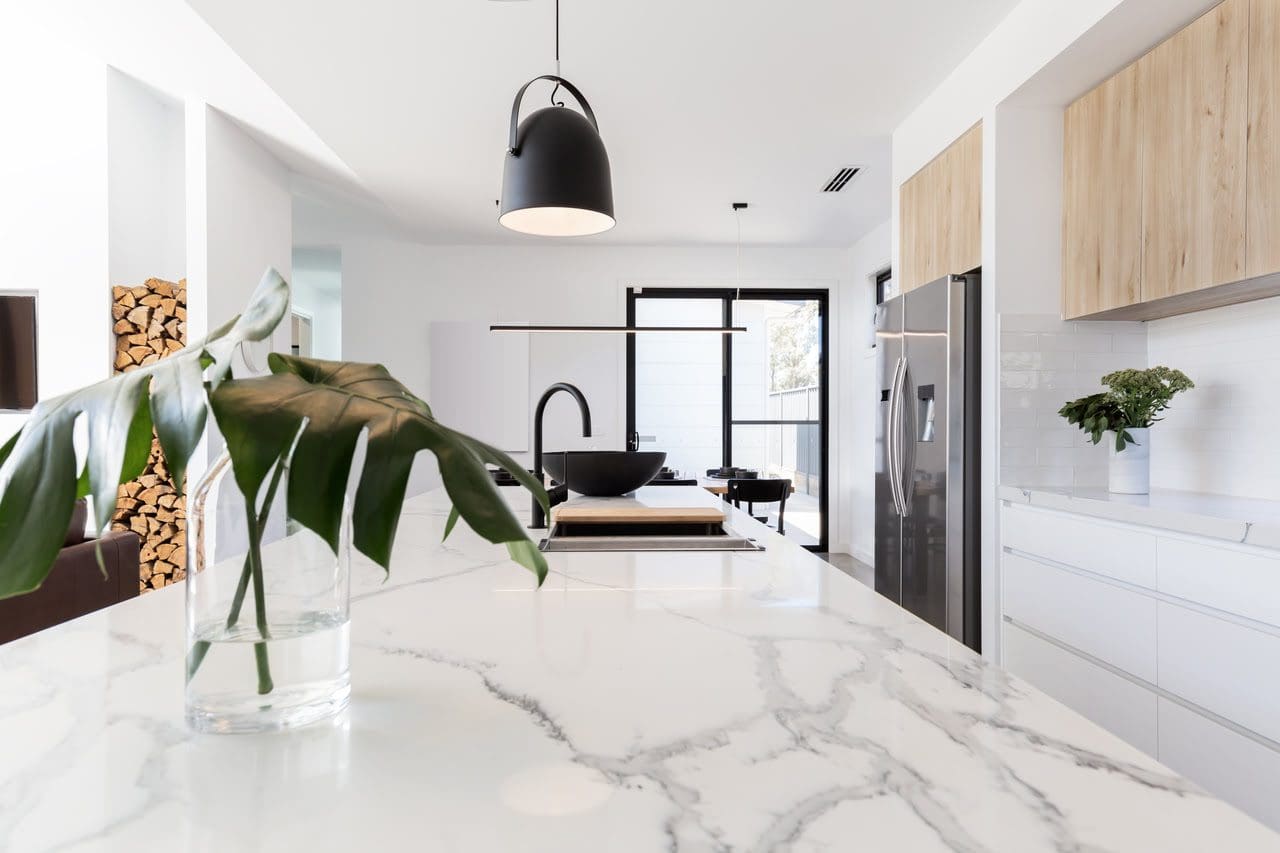
The Ultimate Guide to Choosing the Perfect Kitchen Countertop!
Your kitchen countertop is one of the most important elements of your home. It’s not just a surface for meal preparation, it’s a key design feature that can impact the overall look, functionality, and value of your kitchen. At MTK Countertops, we understand how crucial it is to choose the right countertop that balances style, durability, and budget.
In the article below we will walk you through everything you need to know about selecting the perfect kitchen countertop, from material options to maintenance tips.
Understanding the Different Countertop Materials
When selecting a kitchen countertop, the material you choose will significantly impact the look, feel, and performance of your kitchen. Here’s a breakdown of popular materials, commonly used for kitchen countertops, and their pros and cons:
Granite Countertops
- Pros:
- Durable and scratch-resistant.
- Heat-resistant, making it ideal for placing hot pots and pans directly on the surface.
- Each slab is unique, adding a luxurious and natural feel to your kitchen.
- Affordability, with an industry shift to Quartz, granite has become more affordable
- Cons:
- Requires regular sealing to maintain its resistance to stains.
- Heavier than other materials, so sturdy cabinetry is required.
- Micro fissures and micro pocking can be undetectable until installed
Ideal for: Homeowners looking for a natural, high-end finish on their kitchen countertops.
Quartz Countertops and Manufactured Material
- Pros:
- Non-porous, making it highly resistant to stains, bacteria, and scratches.
- Low maintenance, there is no sealing and re-sealing required.
- Available in a wide range of colors and patterns, including options that mimic natural stone.
- More resilient to production allowing for less waste.
- Cons:
- Can be more expensive than other materials.
- Not as heat-resistant as granite.
- It is not unique, so all material from your house to the neighbors house is identical material.
Ideal for: Busy families or homeowners seeking a durable, low-maintenance kitchen countertops.
Marble
- Pros:
- Timeless, elegant appearance with natural veining that adds character.
- Cool surface, ideal for baking and pastry-making.
- Cons:
- Prone to staining and etching from acidic substances like lemon juice or vinegar.
- Requires regular sealing and careful maintenance.
- Is not food safe, so regular use for cooking and prepping can impart bacteria into the stone.
Ideal for: Homeowners prioritizing aesthetics over durability.
Natural Stone (non Granite) Countertops (Soapstone, Limestone, Travertine, Slate)
- Pros:
- Unique, natural appearance that complements various kitchen styles.
- Natural patina over time which cannot be re-created.
- More Eco-friendly, material does not require the same level of processing as high polish material.
- Scratches can be sanded out or buffed out without affecting overall appearance
- Cons:
- Requires regular oiling.
- Susceptible to scratches and water damage if not properly maintained.
Ideal for: Homeowners looking for a rustic or farmhouse-style kitchen countertops.
Solid Surface Countertops (Corian, WilsonArt Solid Surface, Hi-Macs)
- Pros:
- Solid surface countertops are hygienic and easy to clean.
- Resistant to stains and moisture, making them a good choice for busy areas like kitchens.
- Countertops can be joined with seams that are hard to see, and they can be thermoformed into custom shapes.
- Easier to repair compared to other materials.
- More prone to scratches than other countertops.
- Can be damaged by high temperatures, so you should use trivets or heat pads when placing hot items on them.
- Can be damaged by liquids containing harsh chemicals like oven cleaners, lacquers, or polish remover.
- Cons:
- More prone to scratches than other countertops.
- Can be damaged by high temperatures, so you should use trivets or heat pads when placing hot items on them.
- Can be damaged by liquids containing harsh chemicals like oven cleaners, lacquers, or polish remover.
Ideal for: Homeowners looking for visually seamless kitchen countertops or looking to form material into or around architectural features or sinks.
2. Factors to Consider When Choosing Kitchen Countertops
Selecting the right countertop involves more than just aesthetics. Here are key factors to consider:
Budget
- Determine your budget before exploring materials.
- Pro Tip:
- Granite and quartz have low-mid-high options, but there are many producers and suppliers with varying price ranges, so check with your countertop provider.
- Don’t forget to factor in installation costs, outside of the basic countertop installation. Think plumbing, electrical, millwork, carpentry, tiling etc..
Durability
- Consider how often you use your kitchen and the type of activities you perform.
- For heavy cooking and entertaining, opt for durable materials like quartz or granite.
- For occasional use, materials like marble, natural stone or solid surface can work well.
Maintenance Requirements
- Some materials require more upkeep than others.
- Quartz is virtually maintenance-free.
- Natural stones like granite and marble need regular sealing.
Ask yourself “Am I willing to commit to regular maintenance, or do I prefer a low-maintenance option?”
Aesthetics and Style
- Match the countertop material with your kitchen’s overall style and color scheme.
- For a modern, sleek look, consider quartz or polished granite.
- For a traditional or rustic kitchen, honed, leathered suede or matte finish natural stones can be a great fit.
- Pro Tip:
- Visit a showroom (like www.MTKcountertops.com) to see the materials in person and visualize how they’ll look in your space.
3. Countertop Installation: What to Expect
Proper installation is crucial for ensuring your countertop looks great and performs well. Here’s what you can expect during the process:
Step 1: Measurement & Template Creation
- A professional team will visit your home to take precise measurements.
- A custom template should be created using Laser Templating to ensure the highest level of precision and ultimate fit. Be wary of any company that is not using a laser templator. It is almost certain that they will have to do additional unnecessary work in your home in order to complete the installation.
Step 2: Material Fabrication
- The selected material is cut, shaped, and polished at a fabrication facility.
Pro Tip:
- Ask about the technology at use in the fabrication facility. Do they scan the material for imperfections prior to fabrication? Are there high resolution images available to you for pre-inspection? Can they render a 3D design and make that available to you? Do they use CNC routers? Do they use waterjets or bridge saws? All of these aspects of fabrication affect the finished product and what will go in your home for the next 10-20 years. The shops that are keeping up with technology may cost a little bit more
Step 3: Installation
- The countertop is installed by professionals, ensuring flush,tight joints and proper alignment.
- Expect minor adjustments during installation to account for any irregularities in walls or cabinetry.
Step 4: Sealing & Final Touches
- For natural stone countertops, a sealant is applied to protect against stains.
- The team will clean and polish the surface, leaving your kitchen looking stunning.
4. Maintenance Tips for Longevity
To keep your countertop looking its best for years to come, follow these maintenance tips:
Daily Cleaning
- Use a mild, non-abrasive cleaner and a soft cloth to wipe down the surface.
- Avoid harsh chemicals or acidic cleaners that can damage the surface.
Sealing (for Natural Stone)
- Granite and marble should be sealed annually to maintain their resistance to stains.
- Pro Tip:
- Perform a water test: If water no longer beads on the surface, it’s time to reseal.
Preventing Damage
- Use trivets or hot pads to protect against heat damage.
- Always use cutting boards to prevent scratches.
- Wipe up spills immediately to avoid staining.
- We work closely with you to understand your needs and preferences in order for us to provide tailored recommendations.
- Competitive Pricing:
- We offer transparent pricing with no hidden fees, ensuring you get the best value for your investment.
5. Last Step
Enjoy your new kitchen countertops. Considering that the average person will replace their countertops only 1.4 times in their lifetime, have fun, lean into the process, ask a lot of questions and make sure to fall in love with your ultimate selection. If you thought you loved spending time in your kitchen before, wait until your gorgeous new countertops are installed!
